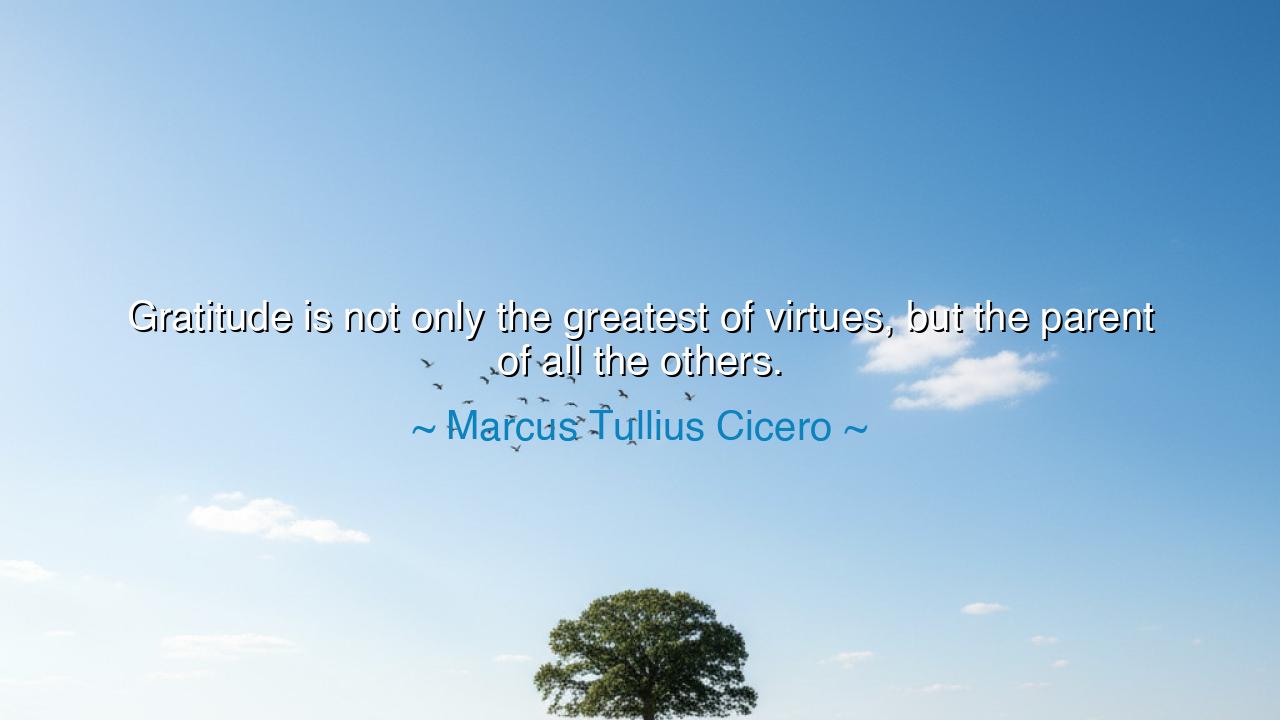
Gratitude is not only the greatest of virtues, but the parent of






Hear, O seeker of wisdom, the voice of the Roman sage Marcus Tullius Cicero, who declared: “Gratitude is not only the greatest of virtues, but the parent of all the others.” In this pronouncement lies a truth as timeless as the rising of the sun: that every noble quality of the human spirit springs forth from the well of thankfulness. Courage without gratitude becomes pride; justice without gratitude becomes cold; love without gratitude becomes possession. But when gratitude lives in the heart, every other virtue finds its root and its nourishment.
The ancients revered virtue as the highest pursuit of man. To the Greeks, the good life was a life lived in accordance with virtue. To the Romans, virtue was the foundation of the Republic, the strength of armies, and the harmony of households. Yet Cicero, the great orator and philosopher, discerned that at the core of all these virtues was one flame—gratitude. For what is humility but thankfulness for one’s place in the vast design? What is generosity but gratitude overflowing? What is patience but gratitude for the hidden wisdom in delay? Truly, all virtues are children, and gratitude is their mother.
How does this manifest in life? Consider a man who lacks gratitude. He may be brave, but his bravery seeks only glory. He may be just, but his justice is hard and unfeeling. He may be wise, but his wisdom is dry and without compassion. Yet a grateful man is brave because he honors the gift of life; he is just because he recognizes the blessings he has received and shares them with others; he is wise because he sees goodness in all things. Thus, Cicero was right to name gratitude the parent, for from it all other virtues are born, and without it, all wither into vice.
History offers us examples. Think of Abraham Lincoln, who rose from poverty and hardship to guide a divided nation. Though burdened with sorrow and responsibility, he was known for his spirit of gratitude—for his country, for those who sacrificed, and even for the lessons of suffering. His deep thankfulness for the resilience of the human soul gave birth to his virtues of compassion, humility, and perseverance. Without gratitude, he might have become bitter or tyrannical; with it, he became a leader remembered for wisdom and mercy.
The same truth was seen in the lives of saints and sages. The Buddha taught compassion, but his compassion was born of gratitude for the awakening that freed him from suffering. The Apostle Paul, though imprisoned and beaten, wrote letters overflowing with thanksgiving, and from that gratitude came the virtues of hope and endurance that inspired generations. Greatness in spirit has always sprung from the fertile ground of thankfulness.
Let us, therefore, learn the lesson Cicero offers: gratitude is not an ornament to life, but its foundation. If you wish to be courageous, begin by being thankful. If you wish to be generous, let your heart first swell with appreciation for what you have been given. If you wish to be just, recognize with gratitude the dignity and worth of every soul. From these springs, the rivers of virtue flow.
What actions, then, must you take? Begin each day not with demand, but with thanksgiving. Speak aloud your gratitude to those around you, so that kindness multiplies. When anger rises, soften it with remembrance of what is still good. When despair creeps in, turn your gaze toward the gifts that remain. In this way, you cultivate the parent of virtues, and with it, you will find the strength to live in honor, humility, and love.
Thus remember Cicero’s wisdom: gratitude is not only the greatest of virtues, but the parent of all the others. To neglect gratitude is to starve the roots of the soul; to embrace it is to let every other virtue grow in strength and beauty. Walk, then, with a heart of thanks, and your life shall bear fruit as a tree planted by living waters—steadfast, generous, and eternal.






AAdministratorAdministrator
Welcome, honored guests. Please leave a comment, we will respond soon